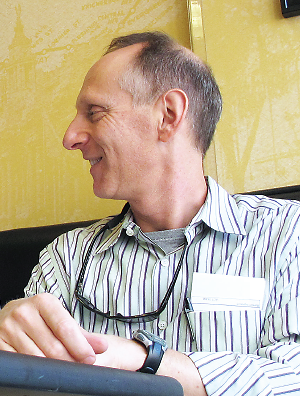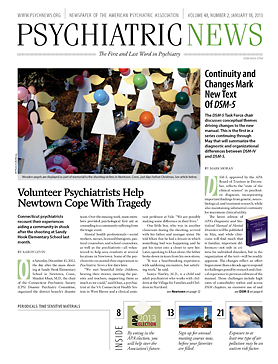For Steven Weinstein, M.D., “recovery” means giving impoverished individuals with serious and persistent mental illness a leg up.
Twice a week, as medical director of Thresholds, one of the oldest and largest psychosocial rehabilitation agencies in the United States, he gets his own legs moving to make that happen. He grabs his satchel with the paperwork and other items he needs, along with—as he puts it—“the principles and practice of recovery-oriented psychiatry,” and out the door he goes.
“I try to embody the principles of offering hope, showing acceptance, approaching people in a way that allows them to feel dignity and that shows them respect. I try to partner with my patients while also holding them accountable and emphasizing that it is their responsibility to make changes.”
Weinstein then exits Thresholds’ headquarters, which is located in the Ravenswood neighborhood in northern Chicago; hops into his black Volvo; and heads off to pay house calls on patients. He makes these home visits as part of an Assertive Community Treatment (ACT) team that meets daily to discuss patients’ issues and successes. All members of this ACT team make such home visits.
Once Weinstein begins his round of house calls, he cruises throughout different neighborhoods looking for a parking spot, enters decrepit apartment buildings or flophouses, and knocks on doors to see whether patients are home. If they are home, it means finding out how they are doing, providing psychotropic medications or psychotropic-medication injections, or trying to convince them to take such medications.
On a recent crisp fall day, Weinstein visited “Don”—a patient with bipolar disorder. Don’s room was a disaster: spoiled food and soiled clothes were strewn everywhere, and cockroaches and bedbugs were evident. “Don’t sit down!” Weinstein whispered to this reporter, who had been invited to accompany him on his rounds.
Weinstein listened attentively as Don talked about his life. He talked to Don about taking psychotropic medications, but without success. “I think he enjoys these manic phases,” Weinstein lamented after the visit. (The good news, however, is that several weeks later, Weinstein reported that his efforts and those of his ACT team colleagues did pay off as Don agreed to take the medications.)
Weinstein then visited “Craig,” a bright young man who was taking a computer class in spite of his schizophrenia. Although Weinstein had placed Craig on high doses of an antipsychotic medication, Craig admitted that the demons in his mind were still tormenting him from time to time. “His is a heartbreaking situation, especially since he lives with family members who have little appreciation of his illness or of what he has to endure,” Weinstein later commented.
Then came a visit with “Ellie.” In spite of her bipolar disorder, she was managing to work part time in a fast-food restaurant, thanks to Thresholds’ supported-employment program. Weinstein relayed a message to Ellie from her boss: “If you stop hurrying so much in your work, your boss will let you work more hours.” Ellie said that she would try to slow down.
As the day moved on, Weinstein visited “Yolanda”—a 57-year-old woman with schizophrenia. In addition to giving her psychotropic medications, he inquired about her breathing and examined her legs for edema since she refuses to see any physician but him. He then accompanied her across the street to a Subway restaurant. There he bought her a sandwich, and the two of them sat at a table and chatted about her life, health, and financial situation.
She talked about growing up in southern Illinois, and Weinstein used his iPhone to show her the geography of that region, not just because he is keen on demonstrating his interest in his patients beyond symptom control, but because he wanted her to think about the path that had led her to Chicago. Finally, as he accompanied her back to her apartment building, he observed, “It looks as if you need some new pants without holes in them. I think our ACT team can get some for you.”
“That would be nice,” she said.
As Weinstein headed back to Thresholds after a day of making house calls, he admitted that he felt somewhat fatigued mentally and emotionally. His wife had once asked him, “How can you stand doing such grim work?”
“Grim? I don’t find it grim,” he replied. “I find it enormously rewarding.” ■



